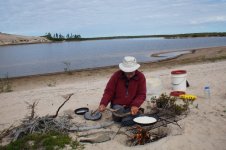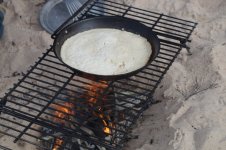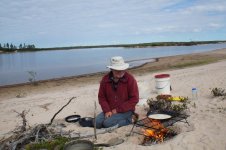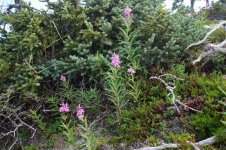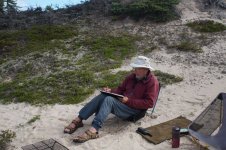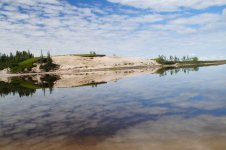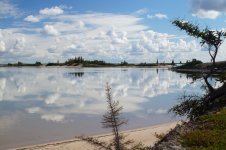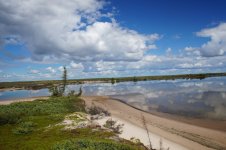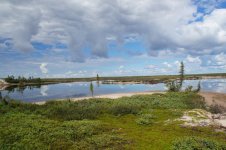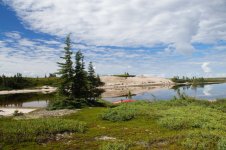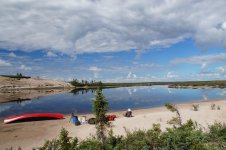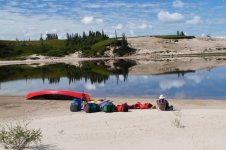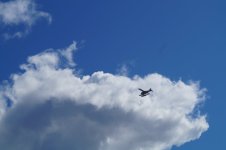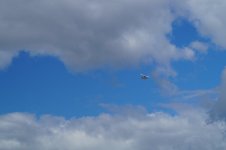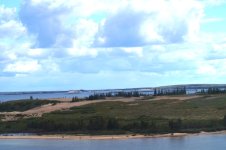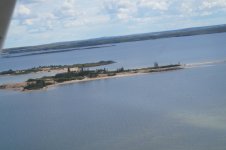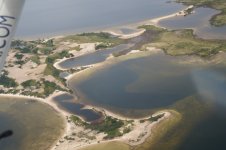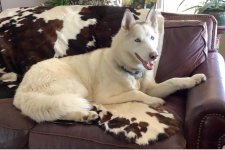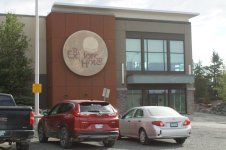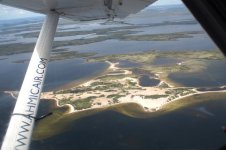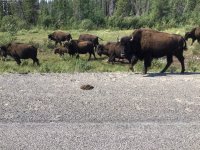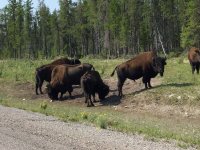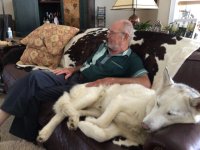- Joined
- Aug 21, 2018
- Messages
- 1,808
- Reaction score
- 4,516
Thursday, July 21. We woke early and looked out of the tent. Overcast and breezy, with some whitecaps out on Lynx Lake. Chilly at ten degrees C (50º F). Much better than yesterday’s brutal weather, though. We decided to make a break for our new pickup spot. We snacked on a granola bar, broke camp quickly, and shoved off the beach at 6:30 a.m.
The paddling conditions remained mostly acceptable for the first hour, after which the wind intensified. I steered the canoe close to shore, even when rounding boulder-clogged points. Twice I jumped out of the canoe to drag and push us free. These constant battles with the wind, waves and boulders were wearing on me, both physically and mentally. As we approached what was the last point before our destination, I yelled out “Get to shore!”
“We can’t land here, Michael. There’s way too many boulders in the way. We can’t get to shore.”
“I don’t mean right here. Let’s go along the point to the beach down there. It’s not too far out of our way. I gotta rest.”
After 10 minutes on the beach, we launched the canoe, and headed back toward the point, beyond which rolling, breaking waves ran before the wind. We would be broadside to those waves when we rounded the point. I didn’t want to be exposed to breaking waves in deep water, so I turned the canoe to be in shallower water, as close as possible to the point.
“What are you doing, Michael? We’re gonna broach on those rocks! Go out farther.”
“I can’t”
“You have to.”
Of course Kathleen was right. When I said “I can’t,” what I really meant was “I don’t want to.” We had only this one last point to round, and then we could head directly to our pickup spot. But, for the first time on any wilderness canoe trip, I was suddenly worried about a capsize, which could initiate potentially fatal hypothermia. Of course hanging up on the boulders, being bashed by strong rollers, could produce the same fatal result. We had to go out farther.
Besides, Kathleen and I have never capsized on a wilderness canoe trip. When people realize that we usually paddle by ourselves, they often ask, “What if you capsize? What if you lose your canoe and gear?"
I always say, “We never capsize.”
“OK. But what if you do capsize?”
“We never capsize. I don’t believe in it.”
“But what if you do?”
“But we don’t.”
“But what if you do?”
“I hear about people on their canoe trips who capsize, and then laugh about it. Capsizing on a wilderness canoe trip is not funny. It’s problematic. Perhaps even dangerous. Kathleen and I don’t capsize.”
“But what if you do?”
“But we don’t.”
Theoretically, this banter could last hours, weeks or even months. In reality it seldom persists longer than 45 seconds.
Anyway, we paddled the canoe farther out, and turned parallel to the rolling, breaking waves. I stroked as hard as I possibly could, with a great deal of anxiety. We rounded the point, turned the canoe landward, and rode the following sea to shore. That wasn’t so bad after all. Likely took less than two minutes. As I always say, “Kathleen and I never capsize.”
We pulled the canoe out the crashing waves, and sat down to rest. I retrieved the GPS from the map case. It said that we had arrived at 8:15 a.m., less than two hours after leaving camp this morning. It also said that we were 500 m (1,640 feet) away from our destination. So I and the GPS strolled left down the beach. Getting farther away. Then we strolled right, down the beach. Still getting farther away.
Stephen recommended we be at 62º 19.58.’ N, 106º 03.1981’ W
My GPS indicated that we were at 62º 19.6.’ N, 106º 02.5’ W
The satellite phone indicted that we were at 62º 19.36.’ N, 106º 2.3’ W
So my GPS believed that we were a smidge north of our destination, while the satellite phone argued that we were slightly south of our destination. Both the GPS and the satellite phone indicated that we were east of our destination. Whom to believe? Well, we were on an open, wishbone-shaped island, with an esker and lots of sand, just like Stephen said.
“I’m pretty sure we’re at the pickup spot, Kathleen. Let’s set up camp.”
After about thirty minutes, we were comfortably ensconced in a truly great campsite. Perhaps even better than our previous favourite camp at the Lynx Creek esker. And certainly vastly superior to our last camp at the usual drop off spot for paddlers heading down the Thelon River. If I were being dropped off for a Thelon River trip, I would want to be dropped off here.
I waited for Kathleen to finish her daily morning bible readings, and then called Stephen to let him know that we had arrived.
“That’s good to hear Michael. I’ve been getting calls every ten minutes from people wanting to be picked up. But the weather yesterday was very bad, and not conducive to flying. The forecast today is also bad. I’d like to come get you today, but the pilot won’t fly under these conditions.”
“Don’t worry about it Stephen. We’re happy to wait for our scheduled pickup tomorrow at noon. This is a great camping spot. We’ll just hang out here until tomorrow.”
“OK. Call me around three if you’ve seen any blue sky. Otherwise, call me tomorrow at 8:00 a.m.”
Just before hanging up, I gave Stephen our coordinates provided by the satellite phone, and by my GPS.
We saw our first patches of blue sky around 10:00 a.m., while enjoying a relaxing bannock breakfast on the beach. Afterwards we retreated to the tent, which we had pitched in a spot completely sheltered from any direct wind. The tent survived yesterday’s strong winds, and deserved a rest. Kathleen and I napped peacefully until 12:15, and woke only when the sun shone upon our faces. This was going very well, indeed.
The sky had cleared even more by one o’clock. We boiled water for a pot of tea, and sat on the beach waiting for three o’clock, when Stephen expected our weather report. W didn’t want to call Stephen though. We didn’t want to tell him that the weather was great for flying. He might suggest that we be picked up today. We didn’t want that. We wanted to stay right here. Besides, we wouldn’t want to reach Yellowknife so late in the day. If the pilot left at three, we wouldn’t reach Yellowknife until nearly 10:00 p.m. We much preferred to be picked up tomorrow. This campsite saved the trip for us. Exactly what we wanted for our last Barren Grounds adventure. Yes. Let’s just sit here and treasure these moments.
We always take a tripod on our wilderness canoe trips. Kathleen suggested taking a picture of us together, treasuring our last moments on the Barren Grounds. She screwed the camera to the tripod, framed the picture, and selected a ten-second delay. She scampered back to sit down beside me. The camera clicked, and the resulting image showed two happy canoeists.
“Might be the last time we relax on a Barren Grounds beach, Michael.”
“Well, that’s what we believed before we came. We do look happy. It was all worth it.”
I called Stephen at three o’clock. “It’s sunny Stephen, and mostly clear.”
“I talked to my pilot, Michael. He doesn’t want to head out now on such a long trip.”
“We don’t want to come out now, anyway, Stephen. Tomorrow is perfect.”
“OK. Call me first thing in the morning to report the weather.”
We heated water on the stove to bath and wash our clothes. We try not to take any unnecessary clothing. For example, we usually take just two pairs of underwear. When the one we’re wearing gets dirty, we change into the fresh pair. In the afternoon we washed the dirty pairs, draped them on a white spruce tree to dry in the sun, and changed into the fresh pair. After all, we will be going to town, to Yellowknife, tomorrow. Got to look and smell as best we can after 17 days on the Barrens. Kathleen showered at the Lynx Tundra Lodge, but I didn’t. Nevertheless, I felt quite presentable.
While lounging of the beach before supper, we saw a snowshoe hare on the opposite shore of the bay. It looked bigger than a snowshoe hare, but what else could it be? We hadn’t seen much wildlife of this trip. A single moose opposite the Lynx Creek Esker. One herd of seven muskoxen, plus a lone muskox through the picture window at the Lynx Tundra Lodge. Kathleen saw two wolves while we were paddling early on in the trip. We had seen many Arctic Terns, and again wondered how they are able to hover so expertly. While I was out this afternoon collecting firewood, I saw a Yellow Warbler and a Killdeer foraging along the beach. Kathleen believes she saw a Gray-cheeked Thrush, a bird that neither one of us had ever ween before.
(Note: When I returned home, I searched the internet to find out how Arctic Terns hover so well. I was unsuccessful, but did find the following information at oceanwide-expeditions.com. “Arctic terns have one of the longest-known migratory routes of all animals. Terns that nest in the Netherlands can travel over 90,000 km (55,900 miles) per year. Arctic terns travel an estimated 2.4 million km (1.491 million miles) in their lifetimes. That’s three round-trip flights to the Moon. Arctic terns do not spend the whole route of their migrations flapping their wings, but instead glide much of the time. Actually, they are such good gliders that they can even sleep while gliding.” Wow!!)
Kathleen cooked beef stroganoff on the fire, and then burned our garbage, which is mostly used bannock baggies. I started our campfire easily with the crowberry collected on the morning of July 12, at the Lynx Creek esker. This was our first fire since then, nine days ago. Have I mentioned how rainy and miserable the weather has been?
We make small campfires, just big enough to cook the meal, heat wash water, and make tea. This is out of both preference and necessity. Wood is scarce on the Barren Grounds, and must be conserved. Small sticks get the job done. After supper, Kathleen enjoyed one of her favourite camping activities, playing with, and poking at the fire.
While Kathleen played and poked, I wrote in my journal. My pen suddenly ran out of ink—a terrible situation. I have to write in my journal. I brought a backup pen, but didn’t know where it was.“I’ll loan you my pen, Michael. But you have to give it back.”
I scribbled hard, hoping to resurrect my ink-less pen. That didn’t work. “Try heating the tip with your lighter, Michael. That sometimes works.”
So I did, and ink flowed out of my pen. Son of gun! Kathleen knows everything. Two minutes later the ink stopped flowing. “OK, Kathleen. I’d like to borrow your pen.”
Before bed we brushed our teeth. Going to town, to Yellowknife, tomorrow. Time to observe all, or at least some hygienic niceties.
In the tent, Kathleen took a picture of the remaining 1/4 of my 1:250,000 topographic map. Lucky that we were barely on that 1/4.
To bed at 7:45 p.m. Twenty-four degrees C (75º F). Completely calm and still, just like the evening we paddled out of Whitefish Lake to the Lynx Creek Esker. This is why we came.
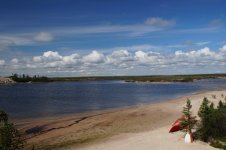
First Patches Of Blue Sky At 10:00 a.m.
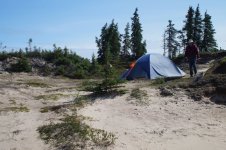
Sheltered From The Wind
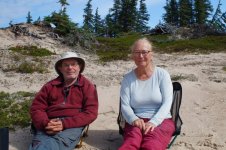
Relaxing On A Barren Grounds Beach
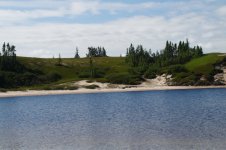
Was It A Large Snowshoe Hare That Hopped Down The Esker?
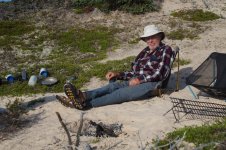
Beef Stroganoff Cooked On A Fire
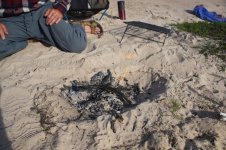
Burning The Garbage
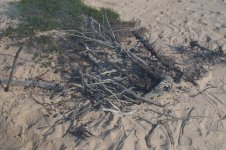
Small Wood Gets The Job Done.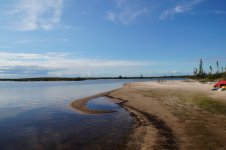
Brushed Our Teeth Before Bed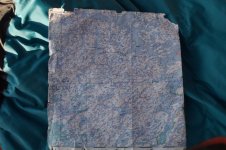
Zoom In To Note Red Arrow Pointing To Our Location, Upper Right Edge.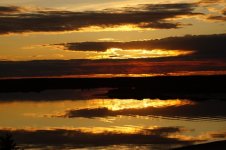
Lynx Lake, July 21, 9:53 p.m.
The paddling conditions remained mostly acceptable for the first hour, after which the wind intensified. I steered the canoe close to shore, even when rounding boulder-clogged points. Twice I jumped out of the canoe to drag and push us free. These constant battles with the wind, waves and boulders were wearing on me, both physically and mentally. As we approached what was the last point before our destination, I yelled out “Get to shore!”
“We can’t land here, Michael. There’s way too many boulders in the way. We can’t get to shore.”
“I don’t mean right here. Let’s go along the point to the beach down there. It’s not too far out of our way. I gotta rest.”
After 10 minutes on the beach, we launched the canoe, and headed back toward the point, beyond which rolling, breaking waves ran before the wind. We would be broadside to those waves when we rounded the point. I didn’t want to be exposed to breaking waves in deep water, so I turned the canoe to be in shallower water, as close as possible to the point.
“What are you doing, Michael? We’re gonna broach on those rocks! Go out farther.”
“I can’t”
“You have to.”
Of course Kathleen was right. When I said “I can’t,” what I really meant was “I don’t want to.” We had only this one last point to round, and then we could head directly to our pickup spot. But, for the first time on any wilderness canoe trip, I was suddenly worried about a capsize, which could initiate potentially fatal hypothermia. Of course hanging up on the boulders, being bashed by strong rollers, could produce the same fatal result. We had to go out farther.
Besides, Kathleen and I have never capsized on a wilderness canoe trip. When people realize that we usually paddle by ourselves, they often ask, “What if you capsize? What if you lose your canoe and gear?"
I always say, “We never capsize.”
“OK. But what if you do capsize?”
“We never capsize. I don’t believe in it.”
“But what if you do?”
“But we don’t.”
“But what if you do?”
“I hear about people on their canoe trips who capsize, and then laugh about it. Capsizing on a wilderness canoe trip is not funny. It’s problematic. Perhaps even dangerous. Kathleen and I don’t capsize.”
“But what if you do?”
“But we don’t.”
Theoretically, this banter could last hours, weeks or even months. In reality it seldom persists longer than 45 seconds.
Anyway, we paddled the canoe farther out, and turned parallel to the rolling, breaking waves. I stroked as hard as I possibly could, with a great deal of anxiety. We rounded the point, turned the canoe landward, and rode the following sea to shore. That wasn’t so bad after all. Likely took less than two minutes. As I always say, “Kathleen and I never capsize.”
We pulled the canoe out the crashing waves, and sat down to rest. I retrieved the GPS from the map case. It said that we had arrived at 8:15 a.m., less than two hours after leaving camp this morning. It also said that we were 500 m (1,640 feet) away from our destination. So I and the GPS strolled left down the beach. Getting farther away. Then we strolled right, down the beach. Still getting farther away.
Stephen recommended we be at 62º 19.58.’ N, 106º 03.1981’ W
My GPS indicated that we were at 62º 19.6.’ N, 106º 02.5’ W
The satellite phone indicted that we were at 62º 19.36.’ N, 106º 2.3’ W
So my GPS believed that we were a smidge north of our destination, while the satellite phone argued that we were slightly south of our destination. Both the GPS and the satellite phone indicated that we were east of our destination. Whom to believe? Well, we were on an open, wishbone-shaped island, with an esker and lots of sand, just like Stephen said.
“I’m pretty sure we’re at the pickup spot, Kathleen. Let’s set up camp.”
After about thirty minutes, we were comfortably ensconced in a truly great campsite. Perhaps even better than our previous favourite camp at the Lynx Creek esker. And certainly vastly superior to our last camp at the usual drop off spot for paddlers heading down the Thelon River. If I were being dropped off for a Thelon River trip, I would want to be dropped off here.
I waited for Kathleen to finish her daily morning bible readings, and then called Stephen to let him know that we had arrived.
“That’s good to hear Michael. I’ve been getting calls every ten minutes from people wanting to be picked up. But the weather yesterday was very bad, and not conducive to flying. The forecast today is also bad. I’d like to come get you today, but the pilot won’t fly under these conditions.”
“Don’t worry about it Stephen. We’re happy to wait for our scheduled pickup tomorrow at noon. This is a great camping spot. We’ll just hang out here until tomorrow.”
“OK. Call me around three if you’ve seen any blue sky. Otherwise, call me tomorrow at 8:00 a.m.”
Just before hanging up, I gave Stephen our coordinates provided by the satellite phone, and by my GPS.
We saw our first patches of blue sky around 10:00 a.m., while enjoying a relaxing bannock breakfast on the beach. Afterwards we retreated to the tent, which we had pitched in a spot completely sheltered from any direct wind. The tent survived yesterday’s strong winds, and deserved a rest. Kathleen and I napped peacefully until 12:15, and woke only when the sun shone upon our faces. This was going very well, indeed.
The sky had cleared even more by one o’clock. We boiled water for a pot of tea, and sat on the beach waiting for three o’clock, when Stephen expected our weather report. W didn’t want to call Stephen though. We didn’t want to tell him that the weather was great for flying. He might suggest that we be picked up today. We didn’t want that. We wanted to stay right here. Besides, we wouldn’t want to reach Yellowknife so late in the day. If the pilot left at three, we wouldn’t reach Yellowknife until nearly 10:00 p.m. We much preferred to be picked up tomorrow. This campsite saved the trip for us. Exactly what we wanted for our last Barren Grounds adventure. Yes. Let’s just sit here and treasure these moments.
We always take a tripod on our wilderness canoe trips. Kathleen suggested taking a picture of us together, treasuring our last moments on the Barren Grounds. She screwed the camera to the tripod, framed the picture, and selected a ten-second delay. She scampered back to sit down beside me. The camera clicked, and the resulting image showed two happy canoeists.
“Might be the last time we relax on a Barren Grounds beach, Michael.”
“Well, that’s what we believed before we came. We do look happy. It was all worth it.”
I called Stephen at three o’clock. “It’s sunny Stephen, and mostly clear.”
“I talked to my pilot, Michael. He doesn’t want to head out now on such a long trip.”
“We don’t want to come out now, anyway, Stephen. Tomorrow is perfect.”
“OK. Call me first thing in the morning to report the weather.”
We heated water on the stove to bath and wash our clothes. We try not to take any unnecessary clothing. For example, we usually take just two pairs of underwear. When the one we’re wearing gets dirty, we change into the fresh pair. In the afternoon we washed the dirty pairs, draped them on a white spruce tree to dry in the sun, and changed into the fresh pair. After all, we will be going to town, to Yellowknife, tomorrow. Got to look and smell as best we can after 17 days on the Barrens. Kathleen showered at the Lynx Tundra Lodge, but I didn’t. Nevertheless, I felt quite presentable.
While lounging of the beach before supper, we saw a snowshoe hare on the opposite shore of the bay. It looked bigger than a snowshoe hare, but what else could it be? We hadn’t seen much wildlife of this trip. A single moose opposite the Lynx Creek Esker. One herd of seven muskoxen, plus a lone muskox through the picture window at the Lynx Tundra Lodge. Kathleen saw two wolves while we were paddling early on in the trip. We had seen many Arctic Terns, and again wondered how they are able to hover so expertly. While I was out this afternoon collecting firewood, I saw a Yellow Warbler and a Killdeer foraging along the beach. Kathleen believes she saw a Gray-cheeked Thrush, a bird that neither one of us had ever ween before.
(Note: When I returned home, I searched the internet to find out how Arctic Terns hover so well. I was unsuccessful, but did find the following information at oceanwide-expeditions.com. “Arctic terns have one of the longest-known migratory routes of all animals. Terns that nest in the Netherlands can travel over 90,000 km (55,900 miles) per year. Arctic terns travel an estimated 2.4 million km (1.491 million miles) in their lifetimes. That’s three round-trip flights to the Moon. Arctic terns do not spend the whole route of their migrations flapping their wings, but instead glide much of the time. Actually, they are such good gliders that they can even sleep while gliding.” Wow!!)
Kathleen cooked beef stroganoff on the fire, and then burned our garbage, which is mostly used bannock baggies. I started our campfire easily with the crowberry collected on the morning of July 12, at the Lynx Creek esker. This was our first fire since then, nine days ago. Have I mentioned how rainy and miserable the weather has been?
We make small campfires, just big enough to cook the meal, heat wash water, and make tea. This is out of both preference and necessity. Wood is scarce on the Barren Grounds, and must be conserved. Small sticks get the job done. After supper, Kathleen enjoyed one of her favourite camping activities, playing with, and poking at the fire.
While Kathleen played and poked, I wrote in my journal. My pen suddenly ran out of ink—a terrible situation. I have to write in my journal. I brought a backup pen, but didn’t know where it was.“I’ll loan you my pen, Michael. But you have to give it back.”
I scribbled hard, hoping to resurrect my ink-less pen. That didn’t work. “Try heating the tip with your lighter, Michael. That sometimes works.”
So I did, and ink flowed out of my pen. Son of gun! Kathleen knows everything. Two minutes later the ink stopped flowing. “OK, Kathleen. I’d like to borrow your pen.”
Before bed we brushed our teeth. Going to town, to Yellowknife, tomorrow. Time to observe all, or at least some hygienic niceties.
In the tent, Kathleen took a picture of the remaining 1/4 of my 1:250,000 topographic map. Lucky that we were barely on that 1/4.
To bed at 7:45 p.m. Twenty-four degrees C (75º F). Completely calm and still, just like the evening we paddled out of Whitefish Lake to the Lynx Creek Esker. This is why we came.

First Patches Of Blue Sky At 10:00 a.m.

Sheltered From The Wind

Relaxing On A Barren Grounds Beach

Was It A Large Snowshoe Hare That Hopped Down The Esker?

Beef Stroganoff Cooked On A Fire

Burning The Garbage

Small Wood Gets The Job Done.

Brushed Our Teeth Before Bed

Zoom In To Note Red Arrow Pointing To Our Location, Upper Right Edge.

Lynx Lake, July 21, 9:53 p.m.


